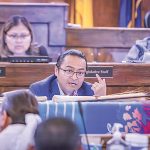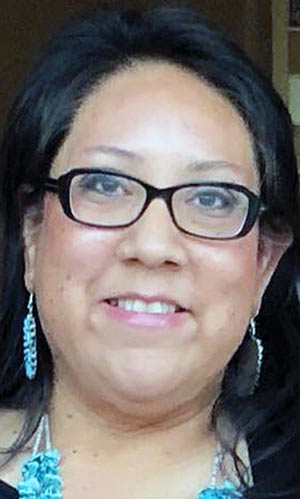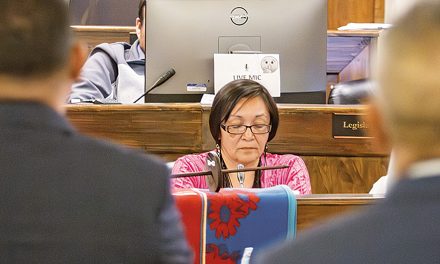
‘More than an attorney’: Nation mourns former legal counsel Karis Begaye
By Alysa Landry
Special to the Times
Author’s note: Two months before she died, Karis Begaye asked me to write her obituary. I resisted, preferring to believe that one day, far in the future, we’d be octogenarian best friends. The following article comes from my own observations, hundreds of conversations with Karis during the last few years, and kind words offered from many of her friends and colleagues. It also includes some sentiments Karis shared with me in recent months. It is my profound honor to write about such a remarkable woman.
FARMINGTON

Karis Begaye
Those who knew her best remember attorney Karis Begaye as an even-tempered negotiator who used her legal acumen to champion tirelessly for the Navajo people.
Strong-willed but kind-hearted and often soft-spoken, Begaye practiced law on the Navajo Nation for nearly two decades, where she was singularly dedicated to moving the Nation forward.
Although she avoided the spotlight, Begaye never backed down from a legal challenge. Her legal expertise and dogged compassion for her people influenced nearly every facet of Navajo life, from land acquisition to gaming, and from transportation to veterans’ issues.
“Karis was more than an attorney,” said LaTonia B. Johnson, assistant attorney general at the Navajo Nation Department of Justice and Begaye’s former colleague.
“She was very determined in her professional life, but she also had a big heart and wanted to do everything she could to help people,” Johnson said. “If something needed to get done, Karis would figure out a way to do it.”
Begaye passed away Sunday, Dec. 5, after a short illness. She was 45.
Born in Fort Worth, Texas, in 1976, Begaye learned to read before she was 3 years old. At a young age, she volunteered with children on the San Blas Islands of Panama, deciding then that she wanted to pursue a career that allowed her to protect children.
“I knew that she was going to be special,” said Begaye’s father, Russell Begaye. “When she was 2, she would ask me to read her the same book 20 or 30 times. Even back then, she was driven. I knew that whatever she chose to do, she would make an impact.”
Begaye played tennis as a teenager and graduated from North Georgia College in 1999. She earned her juris doctorate from Whittier Law School in 2003, then passed the Navajo Nation bar exam in 2005 and started working as an attorney at the Navajo Nation Department of Justice.
Working for the Nation
She spent the next 10 years tackling community and economic development issues, making major strides in the development of Navajo gaming, streamlining business leasing regulations, and expediting the process of taking land into trust.
One of the first things she accomplished was implementation of the Navajo Business Leasing Regulations of 2005, which allowed the Navajo Nation to approve business-site leases on trust land without oversight from the BIA.
Another major accomplishment was Begaye’s work with the Navajo Nation Gaming Enterprise. In 2010, she successfully negotiated the purchase of 400 acres of land for Twin Arrows Navajo Casino – and was able to transfer that land into trust in record time.
“Back then, getting land put into trust for a casino took years,” said Sean McCabe, former chairman of the Navajo Nation Gaming Enterprise. “Karis did it in a few months.”
McCabe, who later served as director of the Division of Economic Development, said the gaming enterprise relied on Begaye to establish casinos on the reservation.
“She was very instrumental in pushing tribal gaming in Arizona and New Mexico and getting the gaming compacts approved,” he said. “The reality is that gaming exists, Twin Arrows exists, and a lot of that has to do with what Karis accomplished.”
McCabe said he will remember Begaye’s business savvy, her “sharp legal eye,” and her ability to move things forward.
“Much of what she accomplished happened behind the scenes,” McCabe said. “She laid the legal framework and got things moving. Nobody knew tribal business law like she did. She was really, really good at what she did. The Navajo Nation has lost one of its best.”
While at the Department of Justice, Begaye helped establish the Uniform Business Lease Regulations of 2008, which granted governance-certified chapters authority to execute local business-site leases. In 2015, she helped renegotiate the gaming compact with the state of New Mexico.
Included in the negotiations were representatives from the governor’s office, state Legislature, and New Mexico’s other gaming tribes—who often disagreed with measures that would benefit Navajo, said LoRenzo Bates, speaker of the 23rd Navajo Nation Council.
‘Tremendous pressure’
As a delegate in 2015, Bates served as chair of the Council’s gaming subcommittee and attended every meeting with the state of New Mexico.
“There was tremendous pressure,” Bates said of the negotiation meetings. “Karis always sat down right next to me and made sure I understood the language and what I needed to say to minimize the complexity of the compact.
“She knew the compact front to back,” he said, “and if there was a question regarding a certain provision, she knew exactly what it was and could explain it.”
Bates still credits Begaye for the compact that regulates Indian gaming in New Mexico.
“The compact that exists today is a result of the dedication and loyalty of Karis Begaye,” he said. “It was a privilege and honor to be able to work side-by-side with her, given her knowledge, her expertise and her dedication. On behalf of the Navajo Nation, I thank her for that.”
Shortly after her father, Russell Begaye, took office as Navajo Nation president in mid-2015, Begaye followed him to the executive branch, where she served as legal counsel for the president’s office until 2018. Russell Begaye remembers offering the job to his daughter three times before she finally accepted.
“She only agreed to work with us if everything was completely transparent,” Russell Begaye said of his daughter. “She finally did it because she knew it was the right thing to do.
“She knew she was uniquely qualified to get things done,” he said. “She knew the inner workings of the Navajo Nation. For her, this was never just a job; it was a chance to learn the system and tackle the hard issues.”
As legal counsel, Begaye helped negotiate the purchase of Wolf Springs Ranch, expanding the Navajo Nation’s land base into Colorado.
She worked closely with all division directors, taking the time to learn as much as she could about every aspect of Navajo business law.
She understood
“I relied on Karis for processing the advance of Navajo airport grants from the FAA and the state,” said Arlando Teller, who served as deputy director of the Navajo Department of Transportation during the Begaye administration.
Teller, who now serves as deputy assistant secretary for tribal affairs at the U.S. Department of Transportation, remembers Begaye as someone who could be both “stoically professional” and “a phenomenal friend.”
“Karis seemed to understand clearly what needed to happen with road projects, transportation needs and partnerships with the state transportation departments,” he said. “But when things got tough, I would just sit with her and we would talk. At the end of the day, she always said, ‘I understand.’”
Of her many contributions at the president’s office, Begaye was most proud of her work on behalf of some of the most vulnerable Navajo citizens, including college students and veterans.
In 2017, she successfully negotiated an agreement with the University of New Mexico to offer affordable housing to Navajo students. The agreement, signed in January 2018, designated 118 rooms for Navajo students in the Lobo Rainforest dormitory.
Begaye gained trust simply by asking questions and listening to people’s stories, said Candice Pioche-Zunie, who formerly represented the Northern Agency on the Veterans Advisory Council.
Begaye attended lengthy meetings with veterans, often enduring hours of complaints before seeking solutions.
“What I really admired about her was that she wanted to learn,” Pioche-Zunie said of Begaye. “She wanted to get to know the veterans and the issues we were having.
“She came and listened,” she said, “giving us her undivided attention sometimes for a full day. She listened until she understood, and then she got things done.
“Our Navajo people have lost a great woman,” Pioche-Zunie added. “I can’t thank Mr. Begaye enough for sharing his daughter with us. I am thankful for her work and support for the veterans.”
Populations that need attention
As legal counsel, Begaye also assigned herself to projects or populations that needed extra attention, said Delegate Mark Freeland (Becenti, Lake Valley, Nahodishgish, Standing Rock, Whiterock, Huerfano, Nageezi and Crownpoint).
“Karis took issues upon herself and brought them to the forefront,” said Freeland, who served as an executive staff assistant under President Begaye. “I’m thankful I had an opportunity to work with her, to see her work ethic and how much she cared for the Navajo Nation. Loving your people is the strongest attribute someone can have.”
During her short career, Begaye made countless contributions to the Navajo Nation. Her work and expertise extended to the Navajo and Hopi partitioned lands and the “Save the Confluence” initiative near the Grand Canyon.
From 2018 until 2021, Begaye practiced tribal, business and family law in Albuquerque.
At the time of her death, she was employed by Genus Law Group, where she worked to protect abused and neglected children. She was a 2021 recipient of the Elite Lawyer Award.
Begaye was laid to rest on Saturday, Dec. 11, after private services in Ardmore, Okla. She is preceded in death by her mother, Helen Shoemaker Begaye, and survived by her father.
“I’m going to miss my daughter,” Russell Begaye said. “I will miss the weekend golf outings where we talked politics, food, business ventures, and everything else.
“I will miss the long drives just to get out of the house to see what we could find,” he said. “I will miss driving to the grocery store looking for ingredients I never knew existed.
“Mostly, I will miss knowing there was always someone watching my back,” he said. “Rest in peace, Karis, and may your journey into the spirit world be an unimaginable delight.”
Alysa Landry is an assistant professor of English at Diné College. She previously worked as a public information officer for the president’s office.








 Highway 264,
Highway 264, I-40, WB @ Winslow
I-40, WB @ Winslow